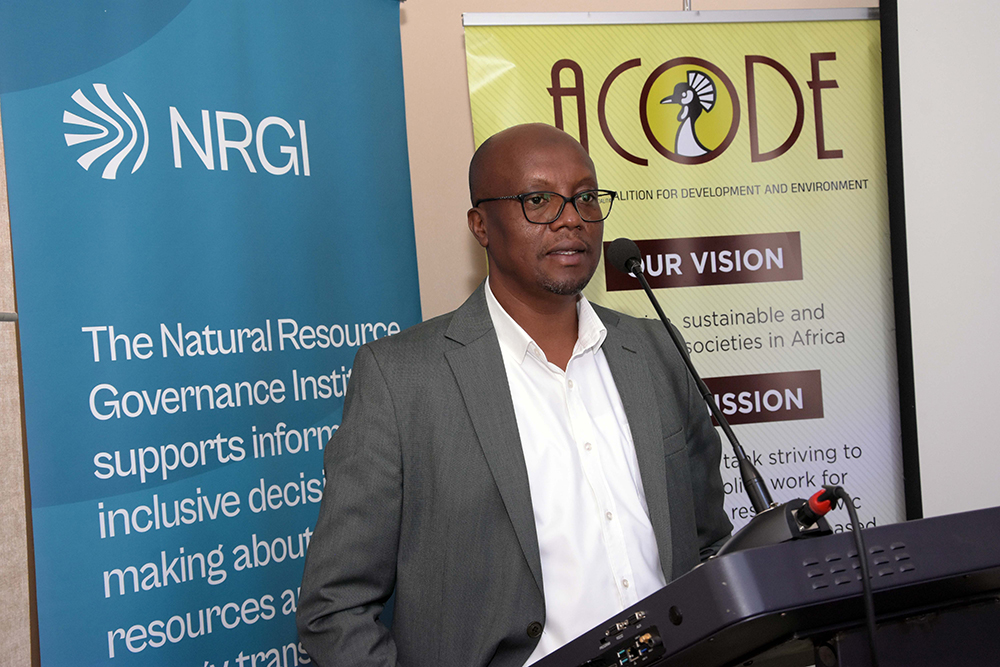CSOs support Uganda mining revenue, urge governance, value addition boast
The finance ministry says it is finalising a new Domestic Revenue Mobilisation Strategy (DRMS) 2025/26–2029/30, which is expected to contribute to Uganda’s “10-fold growth strategy” by expanding the tax base and unlocking more revenue from extractives. The draft will soon be tabled before Cabinet for approval.
Members of the civil society, government officials during a stakeholder dialogue at the Sheraton Kampala Hotel on the draft Domestic Revenue Mobilisation Strategy (DRMS) 2025/26–2029/30. Photo by John Odyek
_______________
Civil Society Organisations (CSOs) have welcomed government’s plan to strengthen domestic revenue mobilisation with a sharper focus on Uganda’s mining sector. However, they have urged stronger governance, value addition and clarity in mineral revenue management.
The finance ministry says it is finalising a new Domestic Revenue Mobilisation Strategy (DRMS) 2025/26–2029/30, which is expected to contribute to Uganda’s “10-fold growth strategy” by expanding the tax base and unlocking more revenue from extractives. The draft will soon be tabled before Cabinet for approval.
During a stakeholder dialogue at the Sheraton Kampala Hotel on September 3, 2025, civil society leaders, economists, and government officials exchanged views on how the extractives industry could drive sustainable growth. The meeting was convened by the Natural Resource Governance Institute (NRGI), the Advocates Coalition for Development and Environment (ACODE), and the finance ministry.
According to the National Development Plan IV, Uganda has set ambitious mining targets: Raise the mining sector’s GDP contribution from 1.9% to 7.9%, expand mineral revenues from shillings 180 billion to 750 billion.
Others are increasing investments in mineral value addition from shillings 200 billion to 1.85 trillion, grow extractives industry jobs from 1.6 million to 2.0 million. Improve governance effectiveness in extractives from 78.5% to 90%.
Civil society response
Bashir Twesigye, the chairperson of the Civil Society Coalition on Oil (CSCO), said over 60 CSOs are ready to work with government on the strategy. Dr Paul Bagabo, the country senior officer of NRGI, noted that mining is central to Uganda’s 10-fold growth ambition. Bagabo noted that engaging with the civil society will enable the inclusion of their ideas and improve the strategy.
Twesigye, the chairperson of the Civil Society Coalition on Oil (CSCO) addressing members of the civil society, government officials during a stakeholder dialogue at the Sheraton Kampala Hotel on the draft Domestic Revenue Mobilisation Strategy (DRMS) 2025/26–2029/30. (Photo by John Odyek)
Government position
Opening the dialogue, Gerald Namoma, the principal economist of the finance ministry, said extractives offer an opportunity to diversify Uganda’s tax base beyond traditional sectors.
Namoma said the DRMS proposes reforms such as integrating mineral taxation with regulatory systems (from mapping and licensing to state participation). It will introduce a windfall tax to capture extraordinary profits. It targets strengthening governance and inter-agency co-ordination to reduce leakages.
20% tax-to-GDP ratio target
DRMS specialist of the finance ministry, Corti Paul Lakuma, noted that Uganda aims to reach a 20% tax-to-GDP ratio by 2030, with mining expected to make a key contribution.
Lakuma highlighted key issues in the minerals sector, emphasising the need to integrate tax and mineral regulatory frameworks. This, he said, involves strengthening mineral mapping, improving the cadaster system, streamlining licensing processes, clarifying the role of the state, formalising artisanal mining and promoting value addition.
Lakuma pointed out that priorities, include designing a unified fiscal regime for minerals, introducing a windfall tax, and ensuring more effective exploitation of mineral resources through transparent governance and stronger coordination. Lakuma further noted that the Domestic Revenue Mobilisation Strategy (DRMS) is a living document that can be revised over time. With Uganda targeting tenfold economic growth, he said citizens should anticipate improved public services, including better healthcare, employment opportunities, roads, schools and enhanced security.
Risks and gaps
ACODE’s research fellow, Paul Twebaze, presented a position paper highlighting risks and gaps in the current framework.
The paper stressed challenges such as unclear provisions on mineral beneficiation under the Mining and Minerals Act 2022, the absence of a formal mineral market, weak enforcement of a ban on unprocessed mineral exports, and lack of a dedicated fund for mineral revenues.
“Minerals are finite resources. Revenues must be invested in ways that guarantee benefits for present and future generations,” the paper warned.
“Uganda’s mineral endowment presents a generational opportunity. With the right policies, we can turn extractive potential into inclusive industrial growth, in line with the National Industrial Policy 2020,” Twebaze said.
CSO recommendations
The CSO position paper called for: establishing a real-time, centralised data-sharing system for mineral production, licensing and revenues, and strengthening mineral tracking systems to curb illicit financial flows. It asked for capitalising the National Mining Company as a commercial investment vehicle.
The other proposals were; fast-tracking projects such as the Iron Ore Project, Mineral Regulation Infrastructure Project, and Uganda Mineral Markets Infrastructure Project. It suggested expanding beneficiation facilities to support in-country processing and link mining to global value chains.